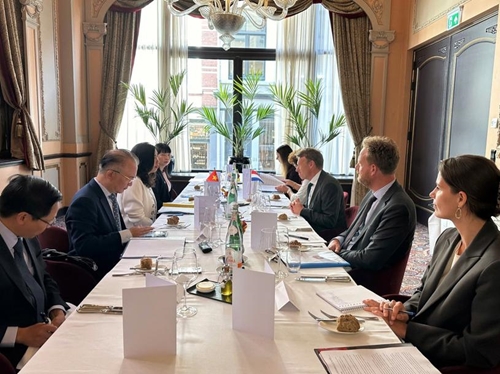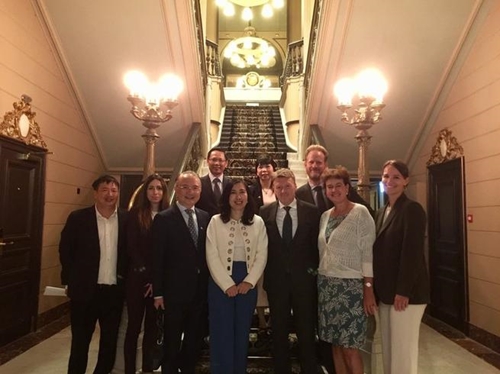Speaking at the event Deputy Minister De Vink highlighted the growing bilateral relations following the visit of Prime Minister Pham Minh Chinh to the Netherlands in December 2022 and Dutch Prime Minister Mark Rutte’s visit to Vietnam in November 2023.
    |
 |
|
Vietnam and Netherlands hold first deputy-ministerial political consultation on July 11 in The Hague. |
He affirmed that the strong political trust between the two countries’ senior leaders, along with the deep affection and over five decades of Dutch support for Vietnam, symbolized by numerous development projects, most notably the Hanoi–Amsterdam High School for the Gifted, provides a solid foundation for further deepening bilateral relations in the coming years.
For her part, Hang said that Vietnam treasures and with to promote its friendship and cooperation with the Netherlands, and thanks the support from the Dutch government and people. She recalled former Prime Minister Rutte’s saying that the Netherlands is always “Vietnam’s European friend,” adding that Vietnam is also the Netherlands’ Southeast Asian friend.
At the consultation, the two sides shared updates on their respective national developments. De Vink praised Vietnam’s extensive reforms and noted the positive feedback from Dutch businesses about Vietnam’s improving investment climate and streamlined administrative procedures. He expressed confidence that Vietnam would continue to achieve its development goals.
Hang emphasized that Vietnam is entering a new era of breakthrough reforms while remaining committed to its foreign policy of independence, self-reliance, diversification, and multilateralization of international relations. She reaffirmed the country’s commitment to maintaining a favorable and open environment for foreign investors and a safe and friendly destination for international tourists.
Both officials praised the implementation of existing cooperative frameworks, especially the Strategic Partnership on Climate Change Adaptation and Water Management and the Strategic Partnership on Sustainable Agriculture and Food Security.
They agreed that Vietnam and the Netherlands have strong foundations to elevate their relationship to a more effective and sustainable level.
The two sides agreed to maintain and enhance existing cooperation mechanisms while establishing new ones. They concurred to strengthen coordination between their foreign ministries, including through the Political Consultation mechanism, to guide cooperation across various sectors, facilitate high-level visits and exchanges, implement leadership commitments, and support each other in international organizations and multilateral forums.
Vietnam affirmed its support for stronger Netherlands–ASEAN ties, while the Netherlands backed Vietnam’s partnership with the European Union (E.U.). Both countries committed to fostering ASEAN–E.U. relations for mutual benefit and global peace, cooperation, and development.
    |
 |
|
Delegates at the political consultation |
The two deputy ministers welcomed the robust growth in economic, trade, and investment ties. In 2024, the Netherlands became Vietnam’s largest trading partner in Europe, with two-way trade hitting 13.77 billion USD, a year-on-year increase of 26%. In the first five months of 2025, trade totaled 5.54 billion USD. The Netherlands is also one of Vietnam’s top foreign investors, with more than 400 projects worth 13.5 billion USD in total. Meanwhile, several Vietnamese firms have started investing in the Dutch market.
Both sides agreed to continue supporting their business communities in exploring investment opportunities, particularly in potential sectors such as shipbuilding, maritime logistics, wind energy, high-tech agriculture, digital technology, semiconductors, digital economy, circular economy, and logistics. They committed to effectively implementing the E.U.–Vietnam Free Trade Agreement (EVFTA), diversifying goods and markets, and responding to global and regional fluctuations.
Hang called on the Netherlands to further open its agricultural market to Vietnamese products and to soon ratify the E.U.–Vietnam Investment Protection Agreement (EVIPA). She urged Dutch support in persuading the E.U. to lift its “yellow card” warning on Vietnamese seafood exports, given Vietnam’s significant progress in combating illegal fishing.
Hang thanked the Netherlands for its effective official development assistance (ODA) projects and proposed continued support for climate resilience initiatives, including flood and saltwater intrusion control in the Mekong Delta, and projects supporting vulnerable regions in Vietnam. She requested Dutch assistance in implementing Vietnam’s climate commitments made at COP26 and COP28.
Regarding other areas of cooperation, both sides also agreed that there remains great potential to expand ties in education, science and technology, defense and security, transportation, culture, tourism, and people-to-people exchange. Hang proposed the Netherlands assist Vietnam in training high-quality human resources to meet development needs in the digital era.
The two officials also discussed the possibility of granting visa exemption for diplomatic passport holders and easing visa and travel procedures for other passport categories.
On this occasion, Hang extended an official invitation to the Netherlands to send a high-level delegation to attend the signing ceremony of the United Nation Anti-cybercrime Convention, scheduled for October in Hanoi.
On regional and global issues of mutual concern, both sides highly valued each other’s objective, balanced and responsible stances, and emphasized that amid a rapidly changing and complex global landscape marked by rising tensions and conflicts, countries must strengthen cooperation to promote peace, stability, development, and the rule of law.
Regarding the East Sea (South China Sea) issue, the Netherlands affirmed its support for ASEAN’s stance on the East Sea, emphasizing the importance of maintaining peace, security and safety of navigation and overflight in the waters. All disputes should be resolved peacefully in accordance with international law, particularly the U.N. Convention on the Law of the Sea (UNCLOS) 1982.
The two sides also expressed their support for ongoing efforts to reform the United Nations and its agencies, aiming to enhance the U.N.’s central role in addressing global challenges and managing international relations.
Source: VNA